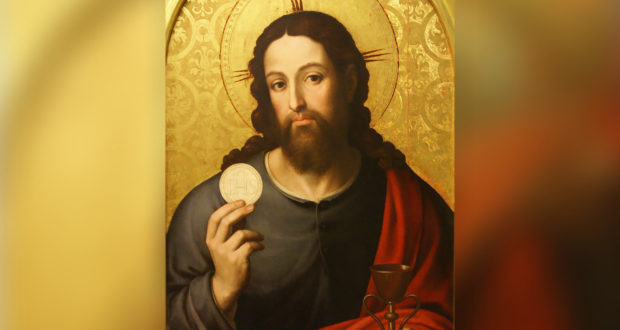Priests are told by their bishop at the time of their ordination that they are to “imitate the Mystery you celebrate.” The priest is to imitate what he makes present on the altar.
Grace works in our souls when we receive Christ in the Eucharist. By grace, if we imitate the Eucharist, imitate Christ in the Eucharist, we can be transformed.
We are not only to receive the Eucharist, we are to imitate the Eucharist. All who receive Christ in the Eucharist should imitate Christ in their family life, in their homes. What instruction does the Eucharist give us for family life?
Three Aspects of the Eucharist
The Eucharist is the sacrament of Sacrifice, Presence, and Communion. These three aspects of the Eucharist instruct the family. The Eucharist instructs us in the practice of the three evangelical counsels. Sacrifice teaches poverty, Presence teaches chastity, and Communion teaches obedience. The Eucharist enables us to live the three evangelical counsels by teaching us how to learn from the Eucharist what Christ desires for us to accomplish.
The Sacrifice of the Eucharist, the Sacrifice of the Mass, is the Sacrifice of Christ on the Cross. St. Paul connects the Eucharist, and the sacrifice of Our Lord on the Cross, and the continuation of His sacrifice in the Mass.
St. Augustine teaches [that] on the altar, Christ is present and slain and sacrificed. The Mass is a true Sacrifice. Christ Himself consecrates and offers the sacrifice. Christ Himself offers every Mass, which is why the priest is another Christ. The sacrifice that He offers is the sacrifice of Himself.
The Sacrifice of Christ
The Sacrifice of Christ corresponds to the evangelical counsel of poverty. Christ displays a certain poverty by coming down to His creatures in the form of bread and wine. Poverty is not just an absence of created goods. Poverty is a detachment from earthly things.
Poverty is necessary in the family. Poverty, that is a spirit of detachment from created goods, should be practiced in the family. The family must teach poverty which can be learned from the Eucharist. Family members need to detach themselves from the greed of our culture, from the constant drive to have more goods. Poverty has a spiritual significance. Parents must make a deliberate effort to cultivate a spirit of poverty.
The Sacrament of Presence
The Eucharist is also the Sacrament of Presence. Christ is truly and really present to us, His Body, Blood, Soul, and Divinity. His Presence teaches us reverence and, consequently, chastity. Christ is truly Present but He is veiled under the appearance of bread and wine. He is there, truly present to hear us, to listen to us, to know us, to love us, to answer us. The real Presence of Our Lord teaches us that we should reverence the Eucharist, as it is God Himself Present.
We show reverence for Christ in the Eucharist when we bow and kneel and genuflect, and make the Sign of the Cross. This reminds us of the necessity of reverence for Christ. The Mass and the Eucharist is the school for reverence.
Family members should learn from the reverence we practice in church to have reverence for each family member. The reverence that Christ displays to us, and the reverence that we show Him in church, should be brought into the home and the family. Reverence is the ability to recognize the value of everything and of everyone.
Family members should learn from the Eucharist and the real Presence to be truly present themselves in their own homes. Keep faithful to the family dinner. Family members need to be physically present, but also mentally present in their home. To show reverence for each other, members of the family should not be occupied for long times on the phone, playing computer games, or watching television. These are threats to the unity of the family.
The Sacrament of Communion
The Eucharist is also the sacrament of Communion. The Eucharist unites us with Our Lord in Holy Communion. Our Lord has commanded us to receive Him in the Holy Eucharist, to do this in memory of Him, therefore we must obey Him. Thus the Holy Eucharist establishes obedience to Christ, the third evangelical counsel.
At the Last Supper when Christ instituted the Eucharist, He spoke strongly about His commandments. “If you love Me, keep my commandments.” “You are My friends if you do what I command you.” His instructions at the Last Supper are full of commands for our obedience.
We can see the kind of obedience Christ requires when He says, “I am the Vine and you are the branches; apart from Me, you can do nothing.” The obedience that Christ desires is the obedience that Holy Communion should bring about within our souls. This is the obedience of the branches to the vine, and that obedience is not just a matter of the Vine commanding and the branches just obeying. It is far more intimate than that. The branches actually have the life of the Vine within them. This is the kind of obedience that should characterize the family.
The first step to the interior kind of obedience is the external form, discipline. The goal of discipline and obedience in a household should be the same as Holy Communion, that is, to set within the child the principle and the ability to obey. The task of the parent is to form the will of the child, somehow get within the child to form that child from within, so the child will desire to obey and be able to obey. That is what Our Lord desires to accomplish in you, to form you from within, so that you will be able to obey because you will desire to obey.
Sacrifice, Presence, and Communion, — poverty, chastity, and obedience, — this is what the Eucharist teaches us, this is what the Eucharist should form within us. As a family, you should receive the Eucharist together and worship Our Lord in the Blessed Sacrament together. Allow Our Lord to form you from within, allow His grace to find its way into your soul, and also to imitate the Mystery you worship.
This article was excerpted from a presentation given to homeschoolers.

 Seton Magazine Catholic Homeschool Articles, Advice & Resources
Seton Magazine Catholic Homeschool Articles, Advice & Resources


